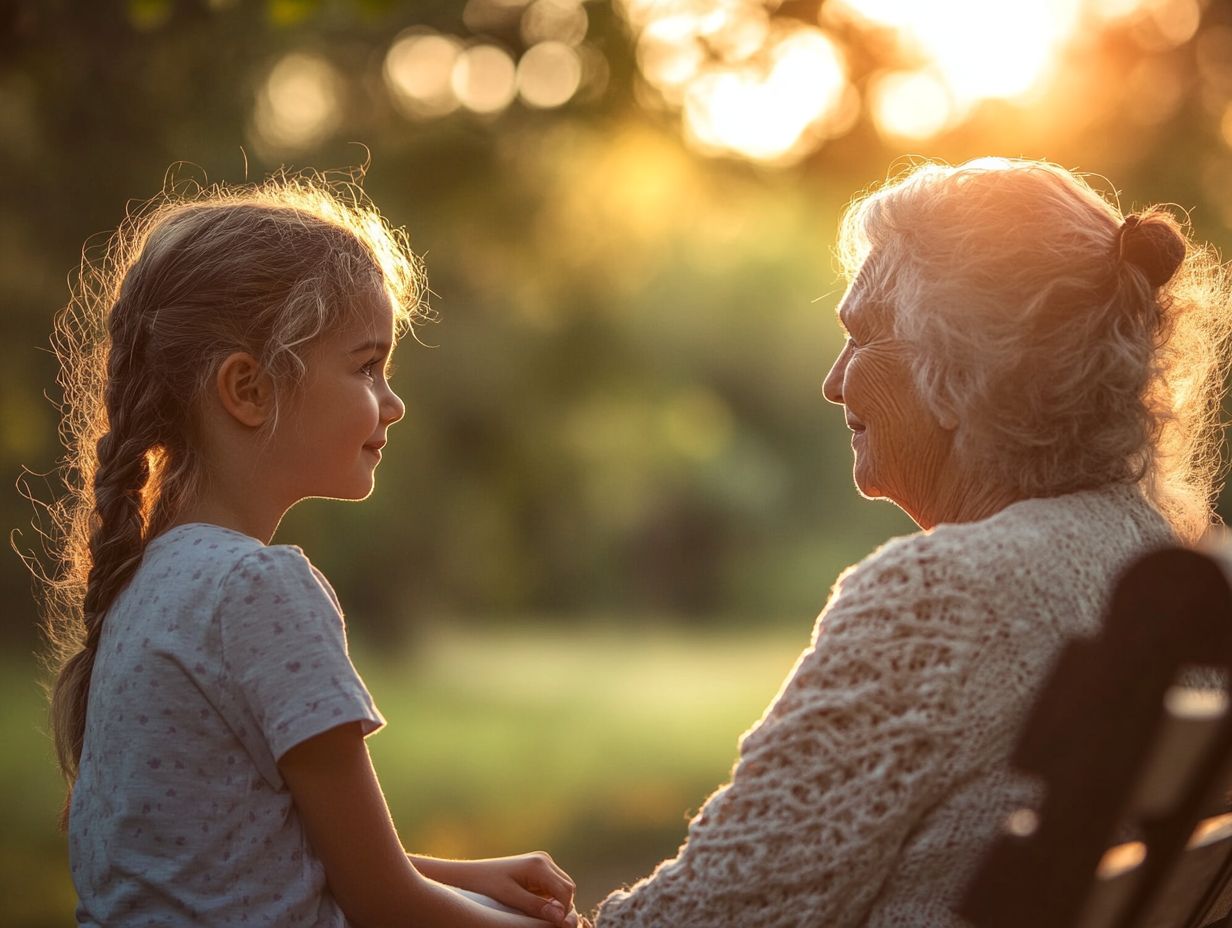The Intergenerational Transmission of Resilience
Resilience is an extraordinary trait that empowers you and your community to rise above adversity.
This remarkable quality can be passed down through generations, shaping family dynamics in profound ways. This article delves into the definition and essential characteristics of resilience, emphasizing its significance in your familial interactions.
It explores how resilience is transmitted from one generation to the next, the various factors that influence this process, and practical strategies you can implement as a parent or caregiver to nurture resilience in your children.
You ll discover how resilient individuals contribute to building stronger, more vibrant communities. Dive into the fascinating world of resilience and see how it impacts you!
Contents
- Key Takeaways:
- Understanding Resilience
- The Importance of Intergenerational Transmission
- Factors Affecting How Resilience is Passed Down
- Ways to Foster Resilience in Children
- Impact of Intergenerational Resilience on Society
- Frequently Asked Questions
- What is the passing down of resilience skills from one generation to another?
- Why is the passing down of resilience skills important?
- How is resilience transmitted between generations?
- Can resilience be inherited?
- What factors influence the passing down of resilience skills?
- How can individuals promote the passing down of resilience skills within their families?
Key Takeaways:

- Resilience is the ability to bounce back from adversity and is a key characteristic of successful individuals.
- Intergenerational transmission of resilience is important as it allows resilient traits to be passed down from parents to children.
- Genetics, environment, and parenting styles all play a role in the intergenerational transmission of resilience and can be developed through practical strategies for parents and caregivers.
Understanding Resilience
Understanding resilience requires you to explore its definition, characteristics, and significance within the context of trauma and mental health. Resilience is your ability to bounce back from adverse experiences like traumatic stress, encompassing various mechanisms that enhance adaptability and lead to positive health outcomes.
For healthcare professionals especially those engaged in trauma recovery and mental health treatment building resilience is very important, both in clinical practice and community support initiatives. By exploring qualitative studies and interventions, you can further assess how resilience impacts educational outcomes and coping strategies.
The American Psychiatric Association stresses the importance of understanding how resilience works, highlighting its critical role in therapeutic environments.
Definition and Key Characteristics
Resilience is your capacity to bounce back from trauma and adapt positively to stress. It embodies key traits such as emotional regulation, optimism, and social support.
These qualities form a powerful foundation, allowing you to navigate life’s challenges with greater ease. Emotional regulation is the ability to control your emotions and reactions, preventing overwhelming feelings from taking over your decisions. Optimism fosters a forward-looking mindset, helping you envision a brighter future even when circumstances seem bleak. Strong social support networks provide important encouragement and a sense of belonging, alleviating feelings of isolation.
Together, these traits encourage healthier coping strategies and significantly bolster your recovery from adversity. They highlight the essential role resilience plays in achieving positive health outcomes and enhancing your overall mental well-being.
The Importance of Intergenerational Transmission
The significance of intergenerational transmission in resilience becomes evident when you consider how resilience factors can be inherited across generations. This is particularly true in families that have endured trauma, such as Cambodian immigrant families, where the echoes of past hardships profoundly influence present family dynamics. Exploring understanding the roots of resilience can provide deeper insights into these dynamics.
Understanding this connection can shed light on how resilience can be cultivated and sustained within families, even in the face of adversity.
In conclusion, recognizing and nurturing resilience within yourself and your family can lead to stronger relationships and healthier coping mechanisms. By applying the strategies discussed, you can foster resilience and create a supportive environment that benefits everyone.
How Resilience is Passed Down from Generation to Generation

Resilience flows through generations, nurtured by family ties and community support. Positive coping strategies and shared experiences help mitigate the effects of trauma. This transmission happens not just through words, but through the actions and reactions that create a safe and trusting environment.
You have the power to cultivate resilience within your family by engaging in storytelling that celebrates overcoming adversity and embracing challenges together. These stories are powerful! They showcase how difficulties can lead to personal growth and emotional strength.
Community support strengthens family dynamics, providing diverse perspectives and shared experiences that reinforce effective coping mechanisms. By actively participating in these interconnected relationships, you can harness resilience, fostering lasting emotional well-being that echoes through generations.
Factors Affecting How Resilience is Passed Down
Numerous factors play a pivotal role in how resilience is passed down, including genetic factors, environmental factors, and diverse parenting styles.
These elements shape how people handle trauma and adversity.
Genetics, Environment, and Parenting Styles
The interplay of genetics, environment, and parenting styles plays a crucial role in shaping resilience. They influence how you develop coping strategies and respond to trauma throughout your life.
If you have a genetic predisposition for anxiety, you may flourish in a supportive environment where open communication is encouraged. This fosters emotional intelligence and adaptive coping mechanisms.
Similarly, a parenting style that promotes autonomy allows you to practice problem-solving, further bolstering your resilience. Effective strategies include:
- Model positive behaviors.
- Teach mindfulness techniques.
- Cultivate strong social connections.
All of these can be nurtured through attentive parenting and a positive social atmosphere, providing you with the tools to face life’s hurdles with confidence.
Ways to Foster Resilience in Children
Fostering resilience in children requires you to employ effective parenting strategies while leveraging community support. By doing so, you can significantly enhance their capacity to navigate challenges and overcome adversity.
Practical Strategies for Parents and Caregivers

Practical strategies for you as a parent or caregiver to promote resilience in children include providing emotional support, encouraging problem-solving skills, and fostering a strong sense of community. These elements are vital in shaping how children navigate life’s challenges.
Creating an open environment where kids feel comfortable expressing their feelings can significantly enhance their emotional intelligence. By teaching them to approach problems methodically breaking tasks into smaller, actionable steps you empower them and instill a sense of accomplishment.
Involving children in community activities or volunteer work strengthens their social networks, highlighting the importance of belonging and mutual support.
Together, these strategies lay a solid foundation for resilient individuals who can face adversity with confidence.
Impact of Intergenerational Resilience on Society
The influence of intergenerational resilience on society is remarkable. When individuals exhibit resilience, they significantly enhance community support systems, improve mental health outcomes, and help diminish health disparities.
Your role in fostering this resilience can create lasting, positive change in your community. Join community efforts to help everyone thrive!
How Resilient Individuals Contribute to a Stronger Community
Resilient individuals like you play a pivotal role in fostering stronger communities by actively engaging in support systems and championing mental health awareness and resilience among your peers.
Your involvement uplifts those around you. It nurtures an environment where collective well-being can flourish. Local advocacy groups frequently organize workshops designed to develop coping strategies, creating a sense of belonging that is invaluable during challenging times.
Mentorship initiatives allow seasoned community members to guide younger generations, facilitating the transfer of knowledge while promoting emotional strength. Programs like community gardens and art therapy collectives create creative outlets and safe spaces, reinforcing connections and encouraging active participation from diverse demographic groups. Ultimately, these efforts strengthen the emotional fabric of the community.
Frequently Asked Questions
What is the passing down of resilience skills from one generation to another?

The passing down of resilience skills refers to the transfer of resilient traits and behaviors from one generation to the next. It is the process by which individuals learn how to cope and adapt to challenges and adversity from their parents or other influential figures.
Why is the passing down of resilience skills important?
This process is vital because it helps individuals develop the skills and mindset needed to overcome obstacles and succeed in life. It actively breaks the cycle of trauma, empowering families to thrive!
How is resilience transmitted between generations?
Resilience can be transmitted through modeling, teaching, and social support. Children learn resilient behaviors by observing their parents or other role models and through direct instruction from caregivers. Positive relationships and support systems also contribute significantly to this transmission.
Can resilience be inherited?
While some genetic components may contribute to resilience, it is not solely inherited. Resilience is a learned behavior that can be developed and strengthened over time through experiences and relationships.
What factors influence the passing down of resilience skills?
Various factors influence this process, including family dynamics, parenting styles, and exposure to adversity. Positive parenting practices and supportive relationships enhance resilience transmission, while trauma and unhealthy coping mechanisms can hinder it.
How can individuals promote the passing down of resilience skills within their families?
Individuals can promote this process by being positive role models, practicing effective communication and problem-solving skills, and fostering open and supportive relationships. Seeking resources to address past traumas can also help in passing down resilience to future generations.






